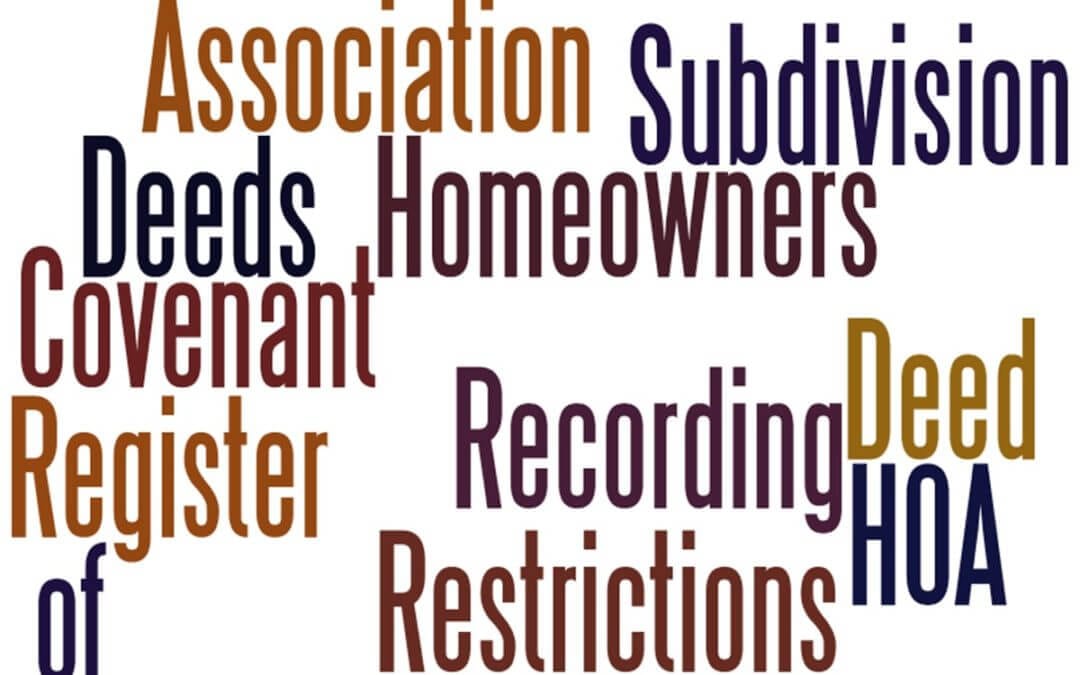In Petersen Financial LLC v Twin Creeks LLC, issued November 22, 2016 (Docket No. 329019) (Published Opinion) the Michigan Court of Appeals held that deed restrictions that were not within the chain of title were not enforceable. In 2000, Twin Creeks, LLC owned the complete parcel of land that was located in the Twin Creek Development (hereinafter “Twin Creek”). In 2002, most of the lots in Twin Creek were conveyed to Carla Wolterstoff, with the remainder of the lots conveyed to her in 2004. In 2006, Twin Creeks, LLC recorded deed restrictions covering all of the lots in Twin Creeks, which had been executed in 2002. In 2011, Carla Wolterstoff lost all of the lots after the Kent County Treasurer foreclosed on an in unpaid tax lien. Peterson Financial, LLC purchased the lots from the Kent County Treasurer at the foreclosure sale in 2011.
Individual owner later purchased lots within Twin Creeks, and the individual owners and homeowners association indicated that they intended to enforce the deed restrictions against Peterson Financial, LLC. Specifically, an individual owner sent an e-mail to Peterson Financial LLC’s real estate agent notifying the agent that the lots that Peterson Financial LLC’s lots were subject to the recorded deed restrictions. Peterson Financial, LLC filed claims for slander of title and to quiet title to determine whether the deed restrictions recorded in 2006 were applicable to the remaining lots.
The Court of Appeals upheld the trial court’s dismissal of the claim for slander of title. In order to prevail on a common-law slander of title claim, a plaintiff must prove “that the defendant maliciously published false statements that disparaged a plaintiff’s right in property, causing special damages.” Fed Nat Mortg Ass’n v Lagoons Forest Condo Ass’n., 305 Mich App 258, 270; 852 NW2d 217 (2014). The Court of Appeals held that Peterson Financial, LLC has produced no evidence that Defendants made comments or other communications regarding the deed restrictions to anyone other than Plaintiff and Plaintiff’s real estate agents. “Publication to an agent of the plaintiff who is acting at plaintiff’s behest and on his behalf is tantamount to a publication to the plaintiff himself, and as such does not fulfill the publication requirement.” Delval v PPG Indus, Inc, 590 NE2d 1078, 1081 (Ind App, 1992). Accordingly, the Court of Appeals held that the publication requirement could not be satisfied in order to establish a claim for slander of title.
The Court of Appeals upheld the grant of Summary Disposition in favor of Peterson Financial LLC on the quiet title claim. First, the Court of Appeals held that the deed restrictions were recorded in 2006 and were outside the chain of title as they were not recorded prior to the conveyance by Twin Creeks, LLC. Second, the Court of Appeals held that the deed restrictions did not constitute a reciprocal negative easement. In order to create a reciprocal negative easement, there must be (1) a common owner, (2) a general plan, (3) and the common owner must have conveyed other lots with express restrictions in those deeds before conveying the lot at issue. Sanborn v McLean, 233 Mich 227, 230; 206 NW 496 (1925). “Thus, the implied restriction arises from the express restriction.” “Reciprocal negative easements are never retroactive.” Sanborn, 233 Mich at 230. The Court held that while there was a common owner at one point in time, there was no evidence that Twin Creek, LLC ever conveyed the property subject to any deed restrictions. Accordingly, the Court of Appeals affirmed the trial court’s finding that a negative reciprocal easement had not been established. Third, the Court of Appeals also affirmed that Peterson Financial, LLC had brought the action in a timely manner and that the doctrine of laches did not apply, when the property at issue was purchased in 2011 and the litigation was filed in 2014. Finally, the Court of Appeals held that while a group of property owners can later establish deed restrictions by an agreement of all owners, that no such agreement existed in this case. Accordingly, the trial court was affirmed on granting summary disposition in favor of Peterson Financial LLC on the quiet title claim.
This case is an important lesson for developers and for homeowners associations. In Michigan, deed restrictions must be recorded prior to the time that the developer starts to convey lots if the deed restrictions were to later be enforceable if the restrictions are to apply to all lots. Interestingly, if Carla Wolterstoff had recorded the deed restrictions while she owned all of the lots, the deed restrictions would have been in the chain of title and been enforceable.
Kevin Hirzel is the Managing Member of Hirzel Law, PLC and concentrates his practice on commercial litigation, community association law, condominium law, Fair Housing Act compliance, homeowners association and real estate law. Mr. Hirzel is a fellow in the College of Community Association Lawyers, a prestigious designation given to less than 175 attorneys in the country. He has been a Michigan Super Lawyer’s Rising Star in Real Estate Law from 2013-2018, an award given to only 2.5% of the attorneys in Michigan each year. Mr. Hirzel was named an Up & Coming Lawyer by Michigan Lawyer’s Weekly in 2015, an award given to only 30 attorneys in Michigan each year. He represents community associations, condominium associations, cooperatives, homeowners associations, property owners and property managers throughout Michigan. He may be reached at (248) 478-1800 or kevin@hirzellaw.com.

